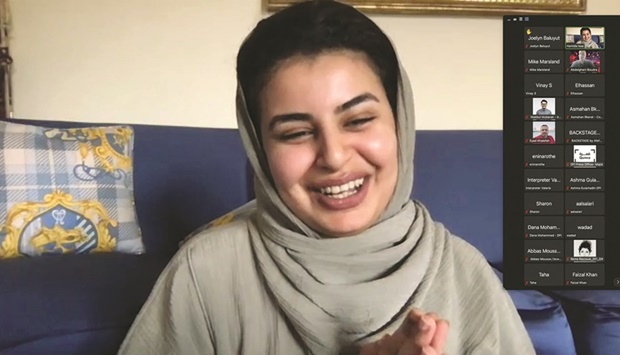Qumra continues to pave robust pathways for emerging and established filmmakers from around the world to create captivating and engaging films. This year’s advanced virtual edition of Qumra 2022, which concluded on Wednesday, nurtured 45 projects including 28 features, six series, and 11 short film projects by filmmakers from 27 countries.
Of the projects, 39 were recipients of the Doha Film Institute’s (DFI) Grants and 26 were supported through DFI training programmes. Qatari filmmakers highlighted the evolution of the homegrown film industry through 16 projects including 13 by Qatari nationals across various formats – feature narratives and documentaries, series, and shorts.
At the concluding media briefing, DFI put the spotlight on new Qumra feature projects that represent the newest trends in filmmaking themes and storytelling approach. The directors from the region and beyond applauded the value that DFI’s comprehensive film ecosystem brings in advancing their cinematic journeys. Qatari filmmaker Hamida Issa, who brings to life one of the first feature documentaries from Qatar, presented the captivating Places of the Soul (Qatar).
“There are multiple layers to this documentary, which evolved over a period of seven years,” said Issa. “The title is inspired by a song by pearl drivers, and my film is my love letter to my mother, my motherland, and to mother nature.”
Director Vinay Shukla’s project 'While We Watched' (India, Qatar) is a raw and timely film that offers an intimate portrait of those on the frontlines of truth in India. He mapped real-life experiences of journalists for his project because “the institution of journalism and journalists are in a moment of crisis now. “There is a huge erosion of trust towards them, which may or may not be justified, based on the situation. My film is about what it means to be a journalist now.”
Concrete Land (Jordan, Qatar) is a feature documentary by Asmahan Bkerat that takes an intimate look at the lives of a nomadic Bedouin family’s struggle to hold on to traditional life under the pressures of urbanisation. “I have witnessed these changes every day and do not take sides about what is better – urban or Bedouin life – but I incorporate subtexts to the narrative that allow audiences the freedom to determine their own perceptions.”
Makbul Mubarak, the director of Autobiography (Indonesia, Singapore, Philippines, Poland, Germany, France, Qatar), said his feature narrative is set in 2017 but presents the “pervasive ghosts of dictatorship that are around us. The biggest challenge for me was to establish the feeling of being haunted by the past.”
Qatar / Qatar
Qumra 2022 brings fresh storytelling perspectives with feature projects from Qatar and across the world

Hamida Issa
